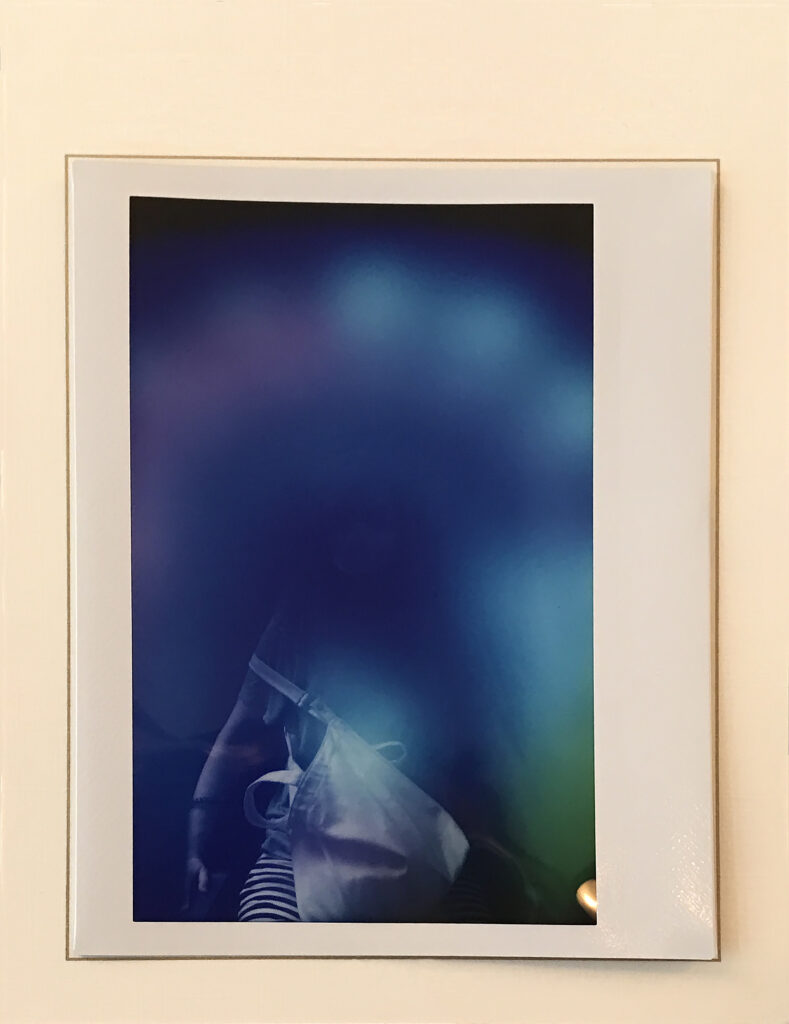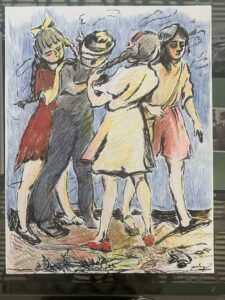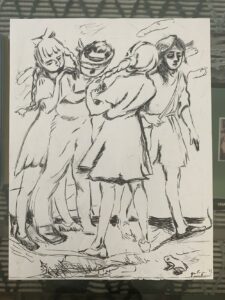Making of a Poem: Leopoldine Core on “Ex-Stewardess”

Leopoldine Core’s aura photo, courtesy of the author.
For our series Making of a Poem, we’re asking poets to dissect the poems they’ve published in our pages. Leopoldine Core’s “Ex-Stewardess” appears in our new Summer issue, no. 244.
How did this poem start for you? Was it with an image, an idea, a phrase, or something else?
Often a poem begins wordlessly. It’s as if the text is a reply to some cryptic spot in the back of my brain that I have become attracted to. I’m alerted to the presence of something that isn’t solid. It has more to do with feeling, tempo, scale, and temperature. I’m so focused on that emanating region that, even though I’m using words, my experience—the start of it—is wordless and meditative.
How did writing the first draft feel to you? Did it come easily, or was it difficult to write? (Are there hard and easy poems?)
Some poems come quick and others take a while. But maybe the one that took years was easier in the end—I don’t know. Certain poems require many rounds of rewording. When this happens I will rewrite one line forty or more times, then narrow it down to thirty, then fifteen, then five, then choose.
But this poem was realized fairly quickly and required zero rewording. That happens sometimes. I tried rewording certain parts at different points but always wound up reverting to the original. The editing I did consisted of deleting maybe seventy percent of what was there, changing the order, capitalizing certain letters, and adding line breaks. I might have added a comma but I don’t think so.
Were you thinking of any other poems or works of art while you wrote it?
Occasionally my friend Jane Corrigan will send me pictures of her paintings and drawings. There are two she showed me around that time—one is a pen drawing and the other is a Xerox of that same drawing that she drew over with pen and colored in with pencil. Jane’s images are infused with such narrative possibility—I like to stare at them for a long time, putting order to the plot. This one seems like a scene from some lost Jane Bowles story.
I wasn’t thinking consciously of these drawings while writing the poem, but there’s something so joyful and stimulating about discourse with friends. I like talking about art that isn’t mine.

Courtesy the author and Jane Corrigan.

Courtesy the author and Jane Corrigan.
What else were you listening to / reading / watching while you were writing this poem?
I was reading a collection of interviews with the filmmaker Claude Chabrol. I underlined this sentence—“I like mirrors, because they are a way of crossing through appearances.” He was talking about manipulating space but I was drawn to a conceptual meaning of the statement—how something solid that reflects the surface of things can also function as an entryway, a portal.
I was listening to Tangerine Dream, Ryuichi Sakamoto, “Dance II” by Discovery Zone, and this mournful song “Believe Me, If All Those Endearing Young Charms,” performed by Mia Farrow in The Muppets Valentine Show in 1974. I love how sincerely she sings to that puppet. She sounds a little like Nico. And there’s something about the confluence of optimism and despair in her voice that might have influenced me.
It also seems relevant to mention that I had gotten an aura photo taken around that time—I kept looking at it. The aura photo I had taken a few years before was mostly red with a cloud of yellow and orange. I was told at the time that the color red implies a closeness to Earth.
But this one was so blue. I kept wondering what that meant. Where was my spirit in relation to Earth? Was it farther from Earth now? I was—am still—grieving the loss of someone I love dearly, and looking at the photo made me think of a sky within.
What was the challenge of this particular poem?
Writing in code. And leaving room for interpretation. The metaphors are there—the stewardess, travel, the dog, the sky, et cetera—but they can also be taken literally. They are what they are and they are something else too.
The poem could be about someone who really reincarnated all these different times and remembers those past lives—though I was thinking more about how we reincarnate many times within a single lifetime, both in terms of how we are seen and in terms of how we really are. We are reborn in the sense that we transform. And yet we carry impressions of the interminable past within us.
I was also thinking about the experience of being objectified over and over. And how those experiences can shape one’s worldview, their sense of what is possible and impossible—and also their sense of time. Stewardess is a dated term that seems, in the poem, to be asking, But has anything changed? Can one really be an ex-stewardess if the treatment is the same? Then it becomes a question of hope—what it might be made of. The poem ends with the act of drawing “an imaginary / animal,” by which I mean the self, and “a field and the / sky”—by which I mean the world. It felt important to depict selfhood in the throes of the imagination—one who works to escape an external gaze, knowing they are not limited to how they are seen, knowing they are multiple.
Leopoldine Core is the author of the poetry collection Veronica Bench and the story collection When Watched, which won a Whiting Award and was a finalist for the PEN/Hemingway Award. She is a National Book Foundation 5 Under 35 honoree. Her fiction and poetry have appeared in The Paris Review, PEN America, Apology Magazine, The American Poetry Review, BOMB, and The Best American Short Stories, among others. She has taught at NYU and Columbia University.
Copyright
© The Paris Review
